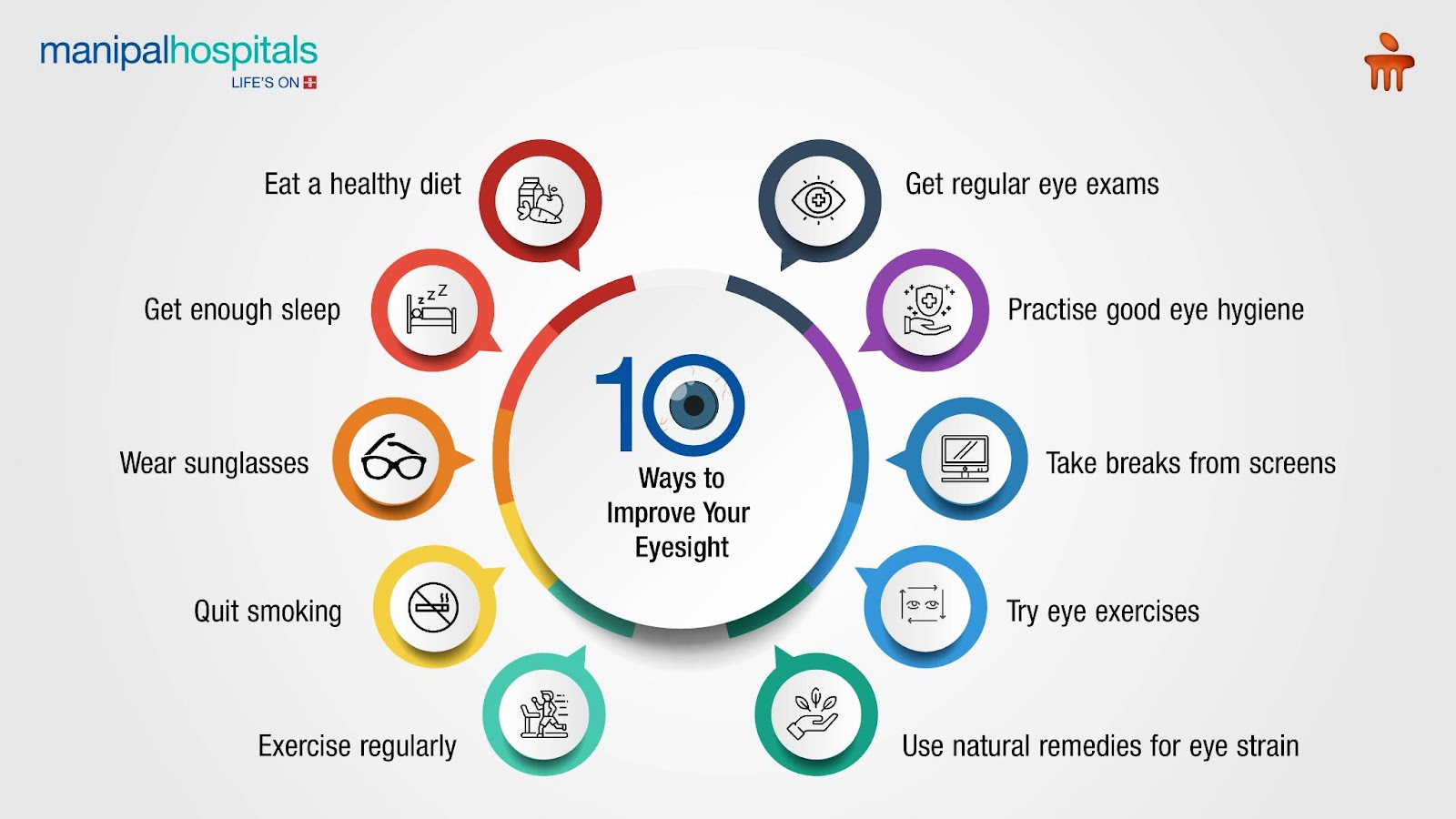
Having good eyesight is very important for living a healthy and fruitful life. It enables us to perceive the wonders of the world that is around us, acquire knowledge and skills, and establish meaningful connections with our fellow beings. However, there are people with various vision impairments, such as nearsightedness, farsightedness, and astigmatism. This makes it difficult to view things distinctly, thus resulting in weariness, migraines, and even hazardous mishaps. If you want to enhance your eyesight using natural methods, there are several ways to do so. Here are 10 tips on how to improve your eyesight.

1. Eat a Healthy Diet
Your diet plays a major role in your overall health, including your vision. Eating plenty of fruits, vegetables, and whole grains will provide your body with the nutrients it needs to support healthy eyes. Specific foods that are good for your eyes include:
- Carrots
- Green leafy vegetables
- Fish
- Eggs
2. Get Enough Sleep
Sleep is essential for overall health, and it's also important for eye health. When you don't get enough sleep, your eyes can become tired and strained. Aim for 7-8 hours of sleep each night.
3. Wear Sunglasses
Sunglasses can help protect your eyes from harmful ultraviolet (UV) rays from the sun. UV rays can damage the retina, which is the light-sensitive tissue at the back of the eye. Sunglasses should block 99% of UVA and UVB rays.
4. Quit Smoking
Smoking is bad for your overall health, and it's also bad for your eyes. Smoking can increase your risk of developing age-related macular degeneration, cataracts, and glaucoma. If you smoke, quitting is the best thing you can do for your eye health.
5. Exercise Regularly
Regular exercise is good for your overall health, and it's also good for your eyes. Exercise can help improve blood circulation to the eyes, which can help prevent vision problems. Aim for at least 30 minutes of moderate-intensity exercise most days of the week.
6. Get Regular Eye Exams
Regular eye exams are important for detecting and treating vision problems early. Your eye doctor can check your vision, eye pressure, and retina for signs of damage.
7. Practise Good Eye Hygiene
Good eye hygiene can help prevent the spread of infections. Wash your hands thoroughly with soap and water before touching your eyes. Avoid rubbing your eyes, as this can irritate them. Take better care of your precious peepers. Watch and learn how to keep your eyes safe from conjunctivitis in the video:
8. Take Breaks from Screens
Staring at screens for long periods can strain your eyes. Take breaks every 20-30 minutes to look at something at least 20 feet away.
9. Try Eye Exercises
Increasing eyesight exercise can help improve your eye coordination and focus. There are several different eye exercises that you can try. Here are a few examples:
- Palming: Close your eyes and place your palms over them. Rest your palms on your forehead for 2-3 minutes.
- Panning: Look to the left, then to the right, then up, then down. Repeat 10 times.
- Zooming: Focus on a small object in the distance, then slowly bring it closer to your face. Repeat 10 times.
10. Use Natural Remedies for Eye Strain
Certain natural remedies can offer relief from eye strain caused by digital screens and other factors. Consider:
- Eye washes: Prepare a cooled chamomile tea infusion and use it as an eye wash to soothe tired eyes.
- Gently massage your temples: Applying gentle pressure to your temples can improve blood flow and reduce eye strain.
- Practice yoga for the eyes: Specific yoga poses can help relax the eye muscles and improve flexibility.
FAQ's
While it's important to manage expectations, certain natural practices and foods for eye health can support good eye health and potentially prevent vision problems from worsening. However, they cannot significantly reverse existing refractive errors like nearsightedness or farsightedness.
Some of the most effective natural tips to improve your eyesight are:
Eating a healthy diet rich in fruits, vegetables, and whole grains, particularly those containing vitamins A, C, and E, and omega-3 fatty acids.
Prioritising sleep to prevent eye strain and fatigue.
Protecting your eyes from UV rays with sunglasses that block 99% of UVA and UVB rays.
Quitting smoking significantly reduces the risk of age-related macular degeneration, cataracts, and glaucoma.
Practising regular eye exercises like palming, panning, and zooming to improve eye coordination and focus.
Unfortunately, there are no quick fixes for lasting vision improvement. However, taking breaks from screens every 20-30 minutes and applying natural remedies like eye washes or gentle temple massages can offer temporary relief from eye strain.
Regular eye exams are crucial for early detection and treatment of vision problems. Schedule an appointment if you experience:
Blurred vision
Eye pain or discomfort
Difficulty seeing at night
Headaches or dizziness associated with vision
Sudden changes in vision
Even if you're diligently following natural eye care practices, regular check-ups with your eye doctor are still essential. The recommended frequency of your visits will depend on your age, family history, and any existing eye conditions. Generally, adults should have a comprehensive eye exam every two years, and those with risk factors may need more frequent examinations.






















 3 Min Read
3 Min Read













